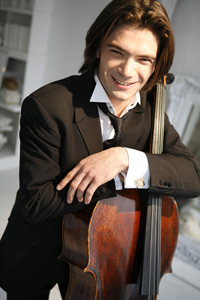 | Gautier Capuςon Cellist Awarded a Victoires de la Musique (the French equivalent of a Grammy) as "New Talent of the Year" in February 2001, award-winning cellist Gautier Capuςon "Gautier Capuςon plays the cello with the control and wisdom of a much older musician. The lightness of his touch and the consistent clarity of his bow strokes are quite admirable in themselves, but when combined with an uncanny sweetness of tone in the higher registers they are breathtaking." "The young Gautier Capuςon shows an exceptional expertise. His sober, incisive, illuminated playing and his profound, sheer and melodic sound give Haydn's First Concerto in C an amazing clarity." | ||
"One constantly wants to talk about Prokofiev. He demands more and more attention from us, demands a simply honest attitude towards him. I am convinced that his works should occupy a place in our artistic life and in our theatre worthy of a true genius, a classic of world music.
There is a desire that Prokofiev's music should be intelligible to those who are not familiar with it or who know it only superficially, and God grant that this music will illuminate many people with its powerful imagery."
Valery Gergiev. Music - Тheatre - Life - Countercomposition
"Prokofiev is often overshadowed by his iconic Russian contemporaries: one slightly older, Stravinsky, the other younger, Shostakovich. Prokofiev can be thought of as just a purveyor of brutal rhythms by some and only a spinner of swooning melodies by others. But if the measure of a great composer is by the range of emotions he summons, then Prokofiev stands as one of the 20th century's greatest, having created music that can be both savage and beautiful. It would be hard to imagine a more authentic, powerful performance of the Scythian Suite than that on Sunday. Gergiev - conducting without a baton or podium, on a level with his musicians -- summoned a vast palette of color, applied with dynamism. The music ranged evocatively from the ethereal to the volcanic, from the play of wind and water in a magical flute melody to the rush of a thousand hooves in the climax."
Bradley Bamberger/The Star-Ledger, Friday November 14, 2008
"The gripping performances these musicians from St Petersburg offered had such intensity, character and insight that it was hard to imagine the music played with more authority.
The orchestra plays an urgent, elemental and repetitive theme in thickly textured, gloriously messy orchestration, with raucous woodwinds, skittish strings and insistent percussion.
The sweep and power of the Kirov Orchestra come from the organic richness and weighty textures of the playing. The string tone is dusky and thick yet never gloppy. The brasses have an unusually mellow coloring. Under Mr. Gergiev their playing was at once assured and impetuous. Employing neither a podium nor a baton, Mr. Gergiev simply stood before his players, the first among equals."
When Prokofiev's Scores Are Players' Native Tongue. Anthony Tommasini // The New York Times. 11.11.08
"Tchaikovsky is the universal genius of Russian culture, the most successful composer "in all Olympic disciplines" , to use a sporting analogy. His music is a model of beauty.
Tchaikovsky's Fifth Symphony is one of the best classical symphonies. Everything in it is perfect. It is particularly popular with performers, and that leads to problems. The same can be said about the Fifth, and indeed about Tchaikovsky's music in general, as can be said about Beethoven: their music is played so often that it seems to be on the verge of triviality. But where is that verge? That is the question a conductor must answer when he starts work on, say, Tchaikovsky's Fifth Symphony. After all, Tchaikovsky is an acknowledged genius who can be placed alongside the greatest symphony composers of all time. And once again there are questions: how close alongside, alongside whom? Beethoven? Brahms, whose antithesis he was, it seems to me? And therein lies the problem. The conductor is faced with a dilemma: if he avoids the customary interpretation, he risks losing its accessibility and may frighten off the audience. On the other hand, if he follows the well-trodden path, repeating what everyone knows by heart, he risks remaining a copyist, losing his individuality. That's what you come up against when you play Tchaikovsky. And so you have to look for something different, alter something. You want to find a new sensation in every bar."
Valery Gergiev. Music - Theatre - Life - Countercomposition
